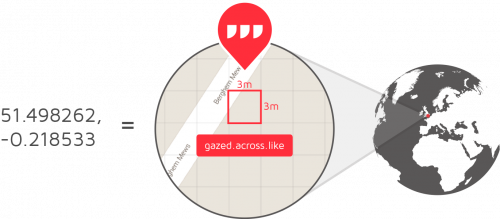what3words is an interesting solution to the problem of the global addresses. What’s the problem, you ask? Well, according to their website:
- Poor addressing costs businesses billions of dollars and hampers the growth and development of entire nations.
- Around 75% of the world (135+ countries) suffers from inadequate addressing.
- 4 billion people are invisible, unable to get deliveries or receive aid, and unable to exercise their rights as citizens.
That doesn’t sound too far from the truth. So, how do they solve it?
what3words is a global grid of 57 trillion 3mx3m squares.
Each square has a 3 word address that can be communicated quickly, easily and with no ambiguity.
Our geocoder turns geographic coordinates into these 3 word addresses and vice-versa.
Using words means non-technical people can accurately find any location and communicate it more quickly, more easily and with less ambiguity than any other system like street addresses, postcodes, latitude & longitude or mobile short-links.
It’s a very elegant solution. Obviously, it doesn’t solve all of the problems (for example, it does not take height into account, so if you have a 50-floor high apartment block, all 50 floors will share the same squares). But this solution is still valuable and super easy to use.
And it’s fun too! I live around crowbar.land.premises, and I work close to simply.approve.pretty. See, I told you.
By the way, what3words has been recently in the news:
Mongol Post, the country’s largest mail provider, has licensed the system from What3Words, and starting in September it will offer customers the option of using the three-word codes. (The company added Mongolian to its first 10 languages; 14 more are coming.)
If that’s not cool, I don’t know what is.
